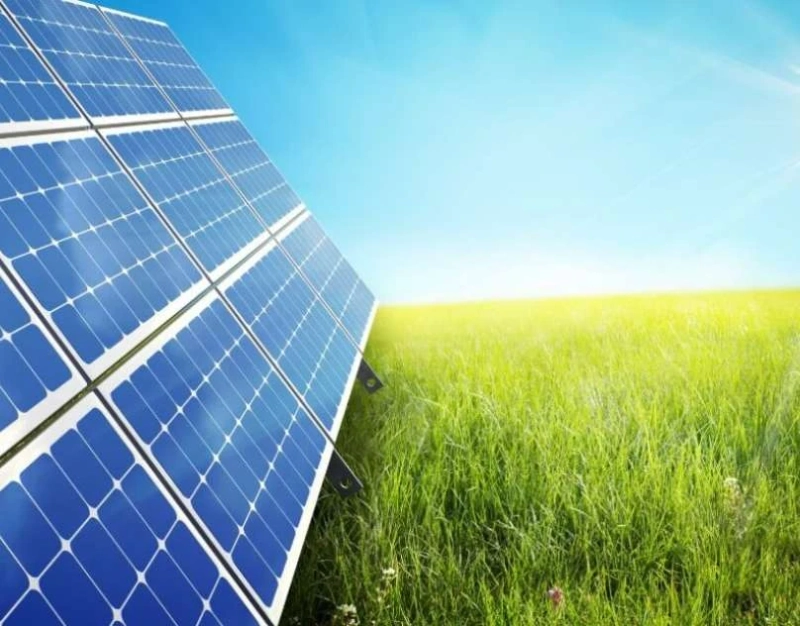What is a solar panel?
A solar panel, also known as a photovoltaic (PV) panel, is a device that converts sunlight into electricity. It is made up of many solar cells that are connected in a series and are embedded in a panel made of durable material, such as glass or plastic, that protects the cells while allowing sunlight to pass through.
Solar cells are made of semiconductor materials, such as silicon, that absorb photons from sunlight, which excites the electrons in the semiconductor material and causes them to flow, resulting in an electrical current. The photovoltaic effect is the name given to this process.
Solar panels come in a variety of sizes and power ratings, which are measured in watts (W) or kilowatts (KW) (kW). They are typically rated between 50 and 400 watts for residential applications, and higher for commercial or industrial applications. They typically have efficiencies ranging from 14 to 22%, and new research has pushed the boundaries, resulting in panels with higher efficiencies.
Solar panels are used in a variety of applications, including powering homes and businesses, providing electricity to remote locations that are not connected to the grid, and providing power to spacecraft and satellites in orbit around the Earth.
How do solar panels work?
Solar panels convert sunlight into electricity by absorbing photons from the sun with semiconductors. When photons strike a semiconductor, they knock electrons into a higher state of energy, resulting in an electrical current flow. Silicon is the most commonly used semiconductor material in solar panels, accounting for approximately 90% of the material used in solar cells.
Many solar cells are connected in series to form a larger circuit in solar panels. The more solar cells in a panel that is connected together, the more electricity the panel can produce. A solar panel’s output is measured in watts. It is important to note that not all of the energy from the sun that reaches the panel is converted into electricity; this is dependent on the efficiency of the panel, which is typically between 14-22% for current commercial solar panels.
Do solar panels work at night?
Solar panels do not produce electricity at night because they are powered by sunlight. They cannot generate electricity in the absence of sunlight.
If you have a grid-connected solar panel system, your panels will generate electricity during the day and send it to the grid. When the sun goes down and you continue to use electricity in your home, you will continue to draw power from the grid as usual.
If you want to generate power at night and be self-sufficient, you must have a battery storage system that stores excess energy generated during the day and allows you to use it at night. These are referred to as off-grid or hybrid solar systems.
Furthermore, some specialized solar panels, such as hybrid solar panels, can generate electricity by utilizing both natural and artificial light. They are, however, not widely used and are usually more expensive than traditional solar panels.
How many solar panels to power a house?
The number of solar panels needed to power a house is determined by several factors, including the total electricity consumption of the house, the location and amount of sunlight available, the efficiency of the panels, and the design of the system.
Assuming that the average home uses about 30 kilowatt-hours (kWh) per day, a typical solar panel system for a home would be in the 5 kW to 10 kW range, with between 15 and 40 solar panels.
It’s important to note that this is only an estimate, and the exact number of solar panels needed for a house will depend on a variety of factors, including average daily electricity consumption, solar panel efficiency, and the amount of sunlight that the location receives. After conducting an assessment of your home’s energy needs and the specific site characteristics, a professional solar panel installation company will be able to provide a more accurate estimate.
Furthermore, even if you have enough solar panels to generate all of your electricity, you will still be connected to the grid and will have to pay for any energy that you use from the grid, and any excess energy you generate will be sent back to the grid and compensated with a feed-in-tariff.
How to connect solar panels
Connecting solar panels can be done in a few different ways, depending on the application and the type of system being used.
Connection in series: Solar panels can be connected in series, which means that the positive terminal of one panel is connected to the negative terminal of the next panel, and so on. This makes the system produce more voltage, but the current stays the same.
Parallel connection: Solar panels can also be connected in parallel. This means that the positive end of one panel is connected to the positive end of the next panel, and the negative ends are also connected together. This makes the system produce more current, but the voltage stays the same.
Series-Parallel Connection: You can also connect solar panels in a combination of series and parallel. This is the most common way to connect solar panels in the real world. This lets you raise both the voltage and the current of the system and fine-tune the overall output to meet the needs of your specific application.
The electricity made by the panels is sent to an inverter, which changes the electricity from direct current (DC) to alternating current (AC), which is what is usually used in homes and businesses.
It’s important to note that this is a simplified explanation. Connecting solar panels should always be done by a professional who is familiar with the local rules and safety guidelines.
This article was first published at https://topclickblogs.co.za/solar-panels-could-be-the-load-shedding-product-you-need-in-south-africa-this-year/
0


